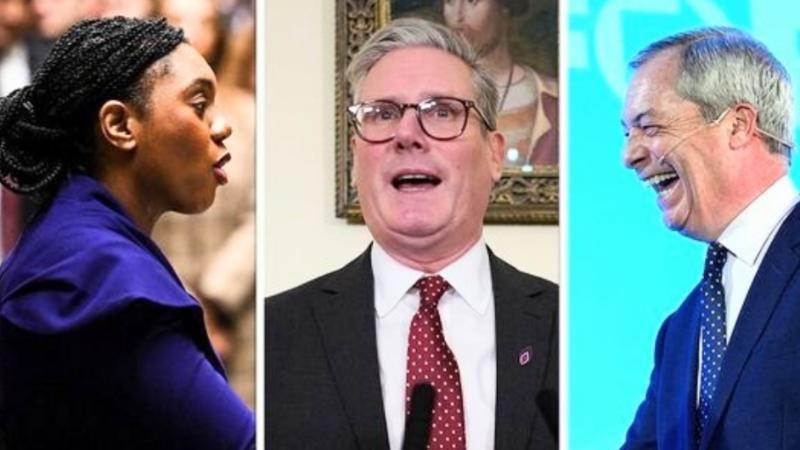The United Kingdom's political landscape is currently dominated by the Labour Party, which secured a commanding majority in the July 2024 general election, with Keir Starmer becoming Prime Minister. The next general election is due by August 2029, but the political dynamics are constantly shifting, with various figures positioning themselves for future influence, especially amidst contentious welfare debates, Daily Dazzling Dawn understands.
Labour's Position and Welfare U-turns:
While Labour holds the reins of power, recent polling data from May 2025 indicates a significant dip in Prime Minister Keir Starmer's personal favourability ratings. His net favourability has sunk to -46, the lowest ever recorded by YouGov, with a majority of Britons (69%) holding an unfavourable view. This suggests a growing public disillusionment, even among Labour voters, as his favourability among them has fallen sharply. Other key Labour figures also show negative favourability, including Deputy Prime Minister Angela Rayner (-31) and Chancellor Rachel Reeves (-48).
A key factor in this declining favourability, and indeed a significant story in itself, has been Labour's recent U-turns on welfare policies. Earlier this week, Starmer announced plans to ease cuts to the winter fuel payment, a move that partially reversed a controversial decision from last year to means-test the benefit. While the details of how many pensioners will regain their entitlement or when the changes will take effect remain unclear, this marks a clear climbdown from Labour's initial stance, which saw 10 million pensioners lose out on up to £300. This U-turn was reportedly influenced by mounting political pressure and potential rebellion from Labour backbenchers.
Furthermore, Starmer is now reportedly privately considering scrapping the two-child benefit cap, a policy introduced by the Conservatives in 2017 that prevents most families from claiming means-tested benefits for a third or additional child born after April 2017. This would be a significant policy reversal, costing the Treasury an estimated £3.5 billion a year, and comes after months of pressure and arguments that the cap is a major contributor to child poverty. The government's child poverty strategy, due for publication in the spring, has been delayed as these measures are being considered.
Despite these personal dips and U-turns, the Labour Party's overall favourability has seen a slight improvement, though it remains in negative territory (-23). The party is perceived by nearly half of Britons as attempting to appeal to voters, particularly those who previously backed Reform UK. However, this strategy appears to be alienating some voters on the left, with an increasing proportion of Green voters stating they would never consider voting Labour.
The Conservative Challenge:
The Conservative Party, now in opposition, is led by Kemi Badenoch, who assumed the leadership in November 2024 after Rishi Sunak stood down. Badenoch faces a monumental task in rebuilding the party's fortunes. Her personal favourability rating has dropped to -39, and her net favourability among even Conservative voters is only +12. The party's overall favourability is the lowest of any party polled, sitting at a net -36.
Badenoch has been quick to criticize both Starmer and Farage on their welfare promises. Regarding the potential scrapping of the two-child benefit cap, Badenoch has branded it "nonsense," stating that the country "cannot afford to lift the two-child benefit cap" given the current economic climate. She has accused both leaders of "making promises, throwing out all sorts of things to please people when they won't be delivered." While she initially appeared to miss Starmer's winter fuel payment U-turn during Prime Minister's Questions, she later urged the government to restore the winter fuel payments in full. Her stance highlights the Conservatives' strategy to portray themselves as fiscally responsible, while also trying to appeal to voters on specific issues.
Nigel Farage and the Reform UK Surge with Welfare Promises:
Perhaps the most disruptive force in current UK politics is Nigel Farage and Reform UK. Farage's personal favourability has seen a notable improvement, rising to -27, the highest YouGov has recorded for him since he took over the leadership of the party. His party, Reform UK, also shows an improved net rating of -14.
Farage has been highly vocal on welfare, using it as a key plank of Reform UK's platform to "outflank" both Labour and the Conservatives. He has explicitly committed to scrapping the two-child benefit cap and fully reinstating the winter fuel payment to all pensioners if Reform UK were to form the next government. This stands in stark contrast to Labour's initial cuts and gradual U-turns, and the Conservatives' staunch opposition to lifting the child benefit cap. Farage and Reform UK claim they would pay for these measures by cutting the foreign aid budget, closing asylum hotels, and ending net-zero subsidies. This populist approach, promising direct benefits to key demographics, is proving effective in drawing voters disillusioned with established parties. While Labour is attempting to woo Reform voters, a significant majority (79%) of those who backed Reform UK in 2024 state they would never consider voting Labour.
Looking Ahead:
The political landscape is volatile. While Labour currently holds a strong parliamentary majority, the declining personal favourability of its leaders, coupled with the rising influence of Nigel Farage and Reform UK on the back of compelling welfare promises, presents a complex challenge. Kemi Badenoch faces an immense uphill battle to revive the Conservative Party, caught between the fiscal realities and the allure of populist policies. The next general election is still some years away, but the currents of public opinion, heavily influenced by welfare policy debates and the perceived honesty and consistency of political leaders, suggest a highly dynamic and unpredictable political future for the UK. The ongoing shifts in favourability ratings indicate that no political position is secure, and the battle for the hearts and minds of the British electorateis far from over.








.svg)



